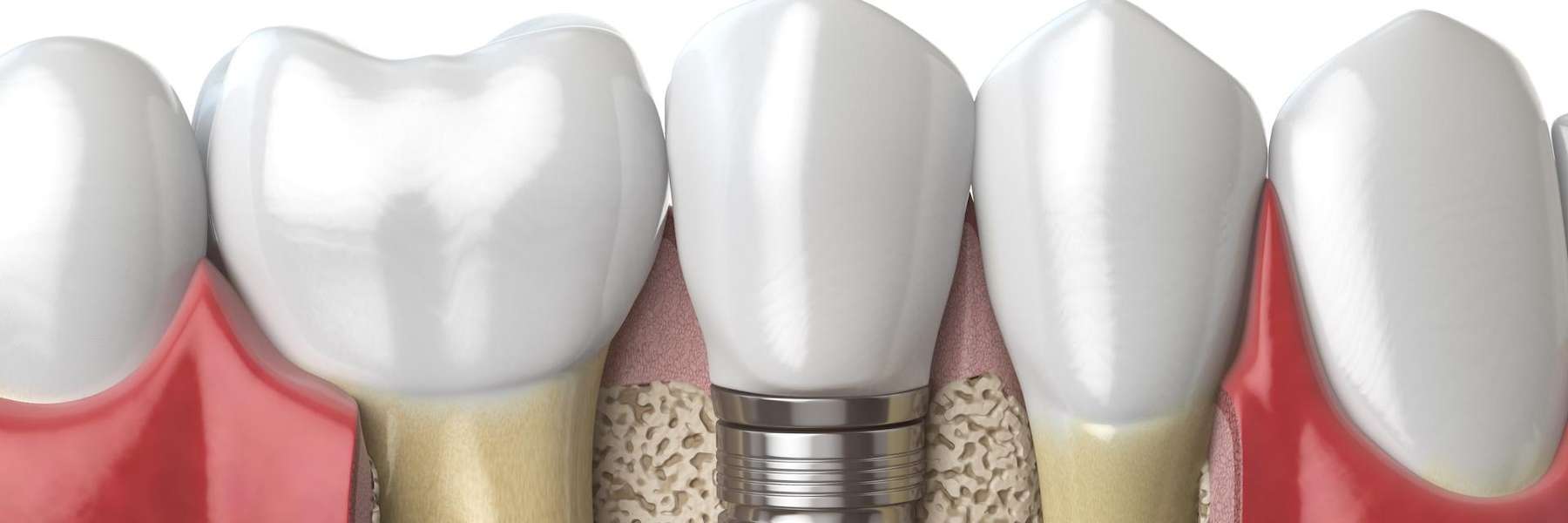
In the event of tooth loss, it's vital that the area in the mouth where the tooth or teeth used to be is treated to prevent future infection or injury. Popular options in these situations include dentures, bridges, or crowns. Most effective, however, are dental implants.
Today, we are taking a brief look at what exactly dental implants are, why they are necessary, why they are effective, and how to properly care for them.
What Are Dental Implants?
Dental implants are the most effective way to replace missing teeth.
A dental implant is a titanium post that is implanted into the jawbone at the site of a missing tooth. The post is covered with protective material and allowed to fuse permanently through a process called "osteointegration" and create an anchoring point for a new dental crown. Dental implants differ from other tooth replacement options in that they replace not only a tooth's crown above the gum line but also its root.
How Do Dental Implants Work?
Once the post is in place and secure, an implant-supported crown, typically custom-made out of porcelain, is fitted on top of the post as a permanent, fixed replacement for the missing tooth. Once this procedure is complete, a patient can once again enjoy the look, feel, and function of a natural tooth.
As with any medical procedure, there is some necessary aftercare required on the part of the patient to ensure the implants' long-term success, both to ensure long-term effectiveness and to prevent gum disease plaque and tartar buildup around the site of the implant. The most important elements of this care include the following:
- Practice good oral hygiene – Like natural teeth, dental implants require good oral hygiene. This includes brushing twice a day with a soft-bristled toothbrush and fluoride toothpaste and regularly flossing and rinsing with antibacterial mouthwash to remove food particles and plaque.
- Schedule regular dental checkups – Patients should regularly visit their dentist to ensure the ongoing health of their dental implants.
- Quit smoking – Smoking increases the risk of implant failure by restricting blood flow to the gums and bones that support the implant.
- Use a mouthguard – For patients who participate in sports with a risk of impact to the mouth and teeth and those who grind their teeth at night.
- Follow your dentist's instructions – A person's body reacts in its own way to dental implants. Thus, it's essential to carefully follow specific care instructions provided by a dentist who is familiar with the patient's medical history.
These tips can help to ensure the long-term health and success of dental implants, which, with proper care, can be expected to last at least a decade, if not longer, without the need for retreatment.
Who Is a Good Candidate for Dental Implants?
While dental implants are an excellent option for patients who've experienced tooth loss, they are, unfortunately, not right for everyone. People receiving dental implants generally ought to:
- Be at least 18 years of age, with a fully-formed jawbone
- Have fairly healthy gums, as people with gum disease can't have dental implants
- Have a jawbone that is strong enough to support an implant
For all of these reasons, before proceeding with any implant procedure, a patient must consult a dentist or oral surgeon familiar with their medical history to determine whether they're a good candidate for dental implants.
The Benefits of Dental Implants Compared with Other Tooth Replacement Options
While dental implants share a number of benefits with other tooth replacement solutions, it is worth noting that in many of these cases, implants distinguish themselves as the superior option:
- Appearance and function – As they are anchored firmly in the jaw and look and feel like natural teeth, dental implants restorative effect on a person's smile and speech (unlike, for instance, dentures, which can slip and cause slurring) and ability to eat without restriction (more or less) are superior to those of other tooth replacement options.
- Confidence – On a related note, the importance of having the confidence that comes with not only having a full set of teeth but one that allows you to engage the world with genuine self-assuredness cannot be overstated.
- Durability – Again, with proper care, dental implants should last for over a decade without the need for retreatment.
- Overall oral health – Dental implants help preserve surrounding teeth by preventing the shifting and bone loss that can occur when a tooth is missing.
Greeley Dentists for Dental Implants
If you're in the Greeley area and are considering dental implants, rather than simply Googling "dental implants near me" and taking your chances, contact dentist Dr. BJ Stewart and the team at Norco Family Dental to schedule a consultation appointment.

